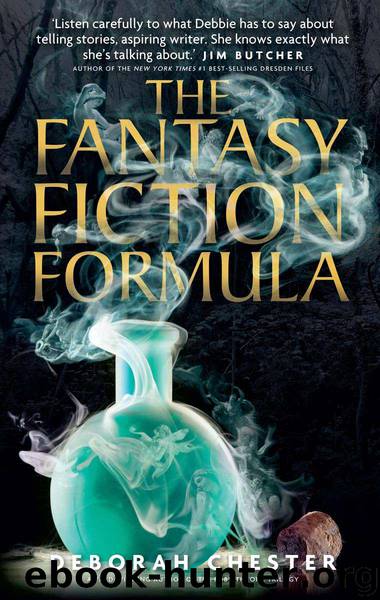The Fantasy Fiction Formula by Deborah Chester

Author:Deborah Chester [Chester, Deborah]
Language: eng
Format: azw3
Publisher: Manchester University Press
Published: 2016-01-01T05:00:00+00:00
Example from The king betrayed by Deborah Chester:
Thum put his hands on the desk and leaned forward to scowl at Dain. “You should rest.”
“I’ve had all winter to rest. Now there’s too much to do.” Impatient for his friend to go, Dain looked up, meeting Thum’s worried eyes. “When I grow tired, I’ll stop. My word on it.”
Thum shrugged. “Nothing I say seems to persuade you.”
“That’s right,” Dain said briskly.
Very often, writers will employ a combination of all three emotion methods in sequel. Emotion and physical feeling can be conveyed through a blend of description, character action, and discussion.
Drill exercise:
Select three emotions that are likely to make a person take action. For example, anger, love, and envy.
Make a chart for each emotion, then deal with one at a time. Think back to one of your memories when you experienced this emotion in a powerful way.
Write down on your chart how you felt physically or from the inside. Don’t edit details or censor yourself. Just jot them as quickly as you can.
When you’ve finished, think about some occasion when you’ve witnessed a person in the throes of this same emotion. How did the individual look—externally? How did you know what the person was feeling? What signals, behavior, expressions, etc. did you observe?
When you’ve finished your chart for each emotion, both internally and externally, make a list of variants. For example, earlier in the chapter I addressed the emotion of fear. Variants would be nervousness, stage fright, terror, etc. Try to think of lesser or milder versions of an emotion as well as the strongest possible ones.
Which internal details would be the same as before? Would there be any different ones? List them.
Repeat this procedure for the external details.
Compare your charts. If there are other emotions that interest you, go ahead and make charts for them as well.
Remember that self-pity is an emotion that destroys reader sympathy for your character. Avoid it.
Also, I’ve already warned you against using apathy. Don’t confuse it with the character cynicism so popular in urban fantasy. Cynicism means a distrust of sincere motives or the best aspects of human nature. It’s often a superficial mask worn by characters to hide their true natures. (Refer to Chapter 14 for more information.) Apathy is true absence of emotion or involvement and is extremely hard to depict well or sympathetically. It will not help you move a story forward. Fantasy stories are about heroes and people who dare strive for achievement. True losers and slackers will not make the effort, or will fold at the first scene setback.
Download
This site does not store any files on its server. We only index and link to content provided by other sites. Please contact the content providers to delete copyright contents if any and email us, we'll remove relevant links or contents immediately.
Asking the Right Questions: A Guide to Critical Thinking by M. Neil Browne & Stuart M. Keeley(5751)
Autoboyography by Christina Lauren(5223)
Eat That Frog! by Brian Tracy(4518)
Dialogue by Robert McKee(4385)
Sticky Fingers by Joe Hagan(4186)
Journeys Out of the Body by Robert Monroe(3610)
Annapurna by Maurice Herzog(3463)
Full Circle by Michael Palin(3443)
Schaum's Quick Guide to Writing Great Short Stories by Margaret Lucke(3368)
Elements of Style 2017 by Richard De A'Morelli(3337)
The Art of Dramatic Writing: Its Basis in the Creative Interpretation of Human Motives by Egri Lajos(3058)
Atlas Obscura by Joshua Foer(2949)
Why I Write by George Orwell(2944)
The Diviners by Libba Bray(2927)
The Fight by Norman Mailer(2924)
In Patagonia by Bruce Chatwin(2919)
The Mental Game of Writing: How to Overcome Obstacles, Stay Creative and Productive, and Free Your Mind for Success by James Scott Bell(2896)
Venice by Jan Morris(2568)
The Elements of Style by William Strunk and E. B. White(2469)
